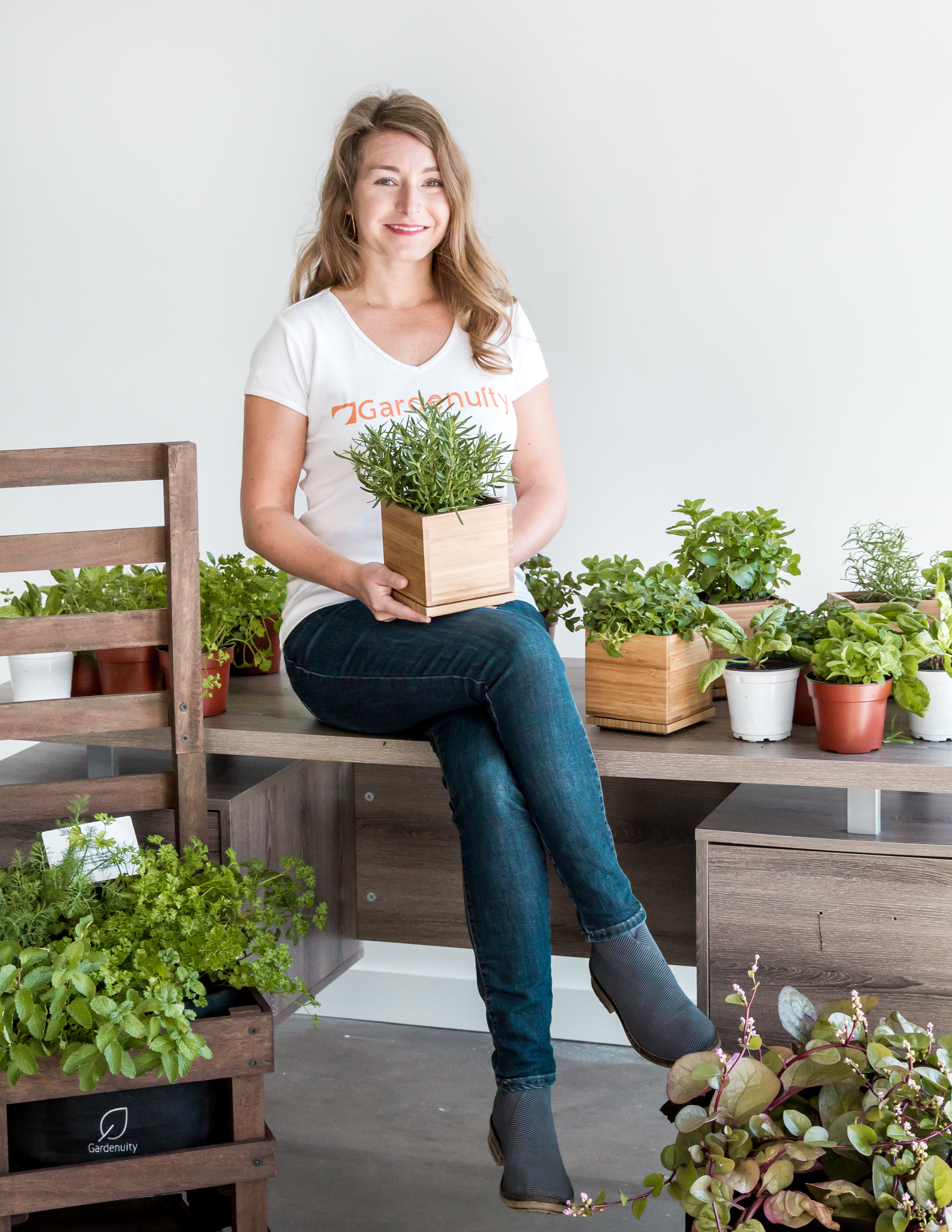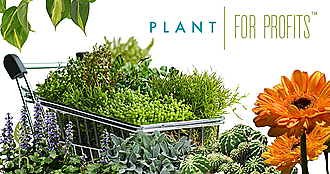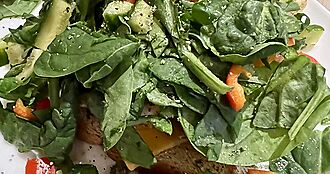Women in Horticulture Series: Brie Arthur, Foodscape Revolution
In my Women in Horticulture Series, I interview green industry professionals about their experiences as a woman, and harvest advice for success for other women in the industry.
Name: Brie Arthur
Profession: horticultural communications
Company/Position: Vice President of horticulture Gardenuity / Green industry communicator and author at briegrows.com
Age: soon to be 39!

Q: Where and how did you start in your career in Horticulture?
My career started in 1999 when I was hired as an intern at Heartland Growers in Indianapolis, IN for the summer between my sophomore and junior years of college. My job was to grow chrysanthemums and other bedding annuals in a sophisticated greenhouse range with some of the greatest growers and managers that I have had the privilege to work with. Within the first week of that internship I knew I would devote my career to this industry in some capacity. Fast forward to today, and I am still working with my first boss, Jeff Mast, now of Banner Greenhouses.
Q: Where are you now in your career in Horticulture? Do you consider yourself a leader?
Almost 20 years later I am finally feeling comfortable in my own skin as a horticulturist. My career has evolved in many unexpected ways, considering my degree is in landscape design and I immediately took a turn off that path by focusing more than a decade of my career in ornamental production. Now, as an industry communicator, author and consultant I am proud of the career that I have built and look forward to what the future brings as functional horticulture becomes a greater focus in the industry.
In the context of leadership, I hope I am on some level. I can live well knowing that the advice and passion I offer is genuine and coming from a place of experience. I hope that my efforts as an advocate for young professionals and as a woman in this industry will resonate and encourage other professionals to acknowledge the importance of what horticulture offers our society and what a rewarding career this knowledge base offers. The green industry is so unique in that there are diverse opportunities and as you gain more experience you can navigate your career in unique ways.
Q: What accomplishment, that you specifically have contributed to your professional success, are you most proud of?
The success of the Emergents in Horticulture Group over the past 5 years is what I am most proud of. It is a privilege to watch a small, online group grow to over 4,000 members representing every facet of the green industry. It has become a resource for networking, job postings and provides a platform for professionals to communicate on important issues. Thanks to the generous support of industry sponsors we are able to host events, offer scholarships and donate money to HRI. Additionally, looking to the future, I am slated to be the youngest woman president of IPPS Southern Region in 2020. I hope to use that platform to engage our growing female membership.
Q: How would you describe your career path, specifically as a woman in the green industry; specifically, did you experience any challenges (for flat out discrimination or even harassment – if you feel comfortable addressing it) you felt were unique to you as a woman?
I have worked in several aspects of horticulture where there was a more profound level of sexism. Wholesale woody production and landscape management specifically. Both of these areas of the green industry are male dominated, and at the time, as a single twenty something aged woman, I encountered challenges, but was so focused on being grateful for the employment that I did not think critically about the reality of the workplace culture. I think women in every generation can likely look back and see discrimination or harassment in retrospect, even when it wasn’t fully recognized in the moment.
It wasn’t until recently that pay inequality across the board really hit home. I did notice that male colleagues advanced in their careers much faster, which frustrated me.
Q: If such challenges did exist along your path, how did you overcome…or if not totally overcome…how did you persist through these challenges and succeed despite them? Can you describe specific tactics you employed that helped you be empowered?
I remember a time when I just wanted to be accepted by the boys club. I was the only woman on the greenhouse spray team in college and after graduating I ran a maintenance crew entirely derived of older men. (This was also very early in my career, so in addition to being a woman I was also inexperienced.) I could swear with the best of them and managed to fit in to a degree, talking about fertilizer, digging schedules, landscape specs, etc. I worked hard to prove myself and learn from my colleagues, both male and female.
One challenge that stands out from my early career relates to making suggestions to my male bosses. When I would have an idea or strategy to improve an aspect of day to day business I was met with challenges from the “we’ve always done it this way” middle management. I was lucky to have a female mentor that gave me some of the best life advice: “figure out how to make the men think it was their idea”. It can be hard and annoying but at the end of the day a good idea will make everything better and it doesn’t matter who gets credit for it. I don’t live under the illusion that sexism isn’t going to continue to exist through out my lifetime. As I get older and become more successful, and thus feel more empowered, I am frustrated to realize I still have to employ that tactic from time to time just to make progress because my voice isn’t always heard or taken seriously.
I now have the pleasure of working with an all female team at Gardenuity- a career move that was very intentional. I am pleased that in this work environment my ideas, suggestions and voice are important, which has been the most empowering experience in my career.
Overall, I think women have to communicate clearly and define expectations from the start. I try to operate in a “no grey area” zone and that has helped considerably in my business relationships across the board.
Q: In what ways, if any, do you feel you used your strengths as a woman to help you gain advantages in your work, or reach your success goals? How would you recommend women today leverage their unique strengths as women?
Considering women are the largest consumer of horticulture we should have an advantage simply because we can relate to the final customer base better. I have been able to use my knowledge as a home gardener and a woman who shops for garden related supplies to connect with the mostly female audiences who attend garden talks across the US while touring with my book, The Foodscape Revolution.
Every person has something different to offer, and the earlier in your career you can identify your strengths and weaknesses the more successful you will be. Sometimes it can be hard to figure out what your best qualities are. I was lost for many years navigating my career, particularly with low wage rates steering my single life decisions. Ultimately I think the most important thing is to be your best self and your unique strengths will become obvious.
Q: In what areas of business operations, management, and co-worker communications do you see opportunities for improvement when it comes to work parity for women?
This is a tough one because this is a systemic issue within our society, and beyond. It’s a human issue, not a horticultural one. When communications are clear and expectations are set by leadership that will help influence how everyone else in a business behaves.
Q: What future goals do you have for yourself as you continue your career in the green industry?
I want my legacy to be that I helped usher in a more relevant use of horticulture and landscapes. I don’t know how exactly to do it, but I’m finding my way and gaining remarkable insights into the possibilities “functional horticulture” can offer. I know this industry can provide tangible solutions to environmental and economic issues that we will continue to face with a growing population. I want to be a part of making horticultural solutions as relevant as possible.
Q: Do you mentor women in the industry, and if so how?
I don’t discriminate, I’ll talk to anyone! But yes, I have been very fortunate to connect with students through IPPS and NCSU horticulture program. It is very rewarding to share my past experiences, host them for garden tours and meals and help guide them through a meaningful career in horticulture. I have written many recommendation letters lately and I believe the future is bright with this new generation rising.
Q: Do you belong to professional organizations or networking groups (not limited to green industry) if yes, which ones do you find to be the most professionally effective– especially as a woman?
GWA has been an important source for networking as my career has transitioned into communications. This organization is derived of a diverse collection of members from across North America with a majority female membership. I have served as National director of region 4 since 2015 which has been a great learning experience.
IPPS SR keeps me in the loop of ornamental production and in touch with many of most influential mentors, namely, Dennis Niemeyer, David Creech and Fred Davies. Since attending my first IPPS meeting in 1999, I am proud to report vast increases of young women attending the annual meeting and am encouraged by the many female students who participate in the scholarship program. I have served on the executive committee since 2014 and will be president of southern region in 2020. The international network that I have established through IPPS has afforded me many opportunities and I encourage all young professionals interested in plant production to get involved with this organization.
Q: Name one think that you do to stay relevant in the industry as times, trends, and technology change?
Remaining an active member in professional organizations has been the best strategy for me to stay relevant and nurture a diverse network in these rapidly changing times. Nothing beats an in person encounter, and there is an endless knowledge base from other attendees at these meetings, which has served me very well over the course of my career. I have also accepted several board positions, which can be cumbersome at times, but a new generation has a responsibility to keep associations moving into the future. I highly recommend volunteering your time and expertise to at least one organization over the course of your career.
Q: What piece of wisdom would you like to pass on to:
- Women of your own age in the workforce: not wisdom, just appreciation: thank you for all that you do to make this industry what it is, and what it can be.
- Women younger than you who are coming up in their careers: be true to yourself and stand up for your rights. You are living in a time when people are listening and you should not have to endure the challenges of the past. Always be kind, professional and considerate and don’t tolerate inappropriate behavior from ANY coworkers.
Thanks Brie!


